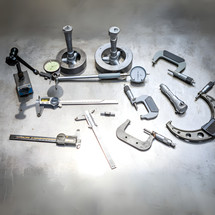23rd Apr 2025
Top 10 Measuring Instruments Every Machinist Should Own
Summary
When it comes to precision machining, having the correct tools is not only a need but also a question of ease!
Whether you’re a beginner machinist or a seasoned professional with years of experience under your belt, superior measuring instruments guarantee that your projects satisfy the closest tolerances and requirements.
Reliable tools from vendors like Penn Tool Co. allow machinists to keep precision, lower mistakes, and increase output.
Let's examine the top 10 must-have measurement tools for any machinist's toolset.
Top 10 Measuring Instruments Every Machinist Should Own
#1 Micrometers
Measuring small dimensions with exceptional accuracy often down to the thousandth of an inch can be a significant challenge. However, that’s where micrometers step in as an indispensable tool. This tool comes in various configurations, making it convenient to measure micrometers.
At Penn Tool Co., companies like Mitutoyo and Starrett provide a great spectrum of micrometers. For instance, the Mitutoyo Outside Micrometer
offers constant measuring and extremely dependable readings with simple-to-use scales and ratchet stops.
Why it matters?
Micrometres allow machinists to measure the fit of different parts over one other. They ensure the parts sit perfectly, down to the last micrometers to avoid assembly or machining errors.
#2 Calipers
Calipers are flexible and easy to use for both inside and outside measurements as well as for depth and step measurements. They’re incredibly convenient, even for beginners. For instance, novice users can opt for digital calipers, like the Fowler Sylvac Caliper from Penn Tool Co., for high-resolution readings.
They are simple to operate and come in a wide range of options, including Vernier and dial calipers, making them a perfect option for individuals who want high precision. They’re also effective for rapid measurements of different components and materials.
Takeaway Tip
For best accuracy, keep your caliper clean and zero it routinely.
#3 Dial Indicators
Dial indicators are a great tool for measuring the surface flatness or alignment of a workpiece. These tools offer great precision for precisely gauging small linear distances and variances.
Beginners looking for reliable dial indicators can head out to Penn Tool Co. for the sensitive and durable Federal Dial Indicator. It’s a perfect tool for multiple purposes, whether you're aligning fixtures, configuring a machine, or checking run-out. It’s a reliable dial indicator under high-test conditions.
Why You Need It?
Pair your dial indicator with a magnetic base support for steady, hand-free usage.
#4 Test Indicators
Test indicators are the best tool to measure radial measurements. They come in handy for surface alignment and lathe operations, giving you the convenience and accessibility of minute operations.
Beginners planning to use test indicators can opt for the Interpaid brand found at Penn Tool Co. The indicator helps access fluid and precision movement with its small form, enabling accurate measurements for hard-to-reach places.
Why You Need It?
Test indications enable easy optimization and configuration. It reduces the probability of component rejection resulting from misalignment.
#5 Height Gauges
Height gauges are a helpful tool for machinists working on flat surfaces. They come handy for vertical marking or measuring component measurements. It gives you the convenience and peace of mind to take accurate measurements.
Thanks to brands like Mitutoyo Digital Height Gauge, today we have height gauges that enable digital readings for precise reading and exact vertical measures. These tools are best used in contemporary CNC workplaces, giving electrical outputs for data logging or scribers for layout work.
Why You Need It?:
Pair your height gauge with a granite surface plate for best accuracy.
#6 Surface Plates
No precision toolkit is complete without surface plates. It’s a great tool for examining parts, calibrating other instruments, and setting up measurements. Every tool in your arsenal depend on these level, steady surfaces as a reference plane.
Beginners planning to go for surface planes can opt for Starrett Granite Surface Plates. They are durable to wear-resistant and provide thermally stable accurations under complex conditions.
Why You Need It?
If not employed on a level ground, even the best measuring instruments might provide significant errors in calculation. A quality surface plate guarantees consistency in your measurements.
#7 Gauge Blocks
Also known as "Jo blocks," or gauge blocks, precision-ground blocks are designed to calibrate equipment or stack to reach a specific length. It’s a convenient tool to deliver accurate results in no time.
The Mitutoyo Grade AS-1 Steel Gauge Block Set is a machinist’s favorite and one of the largest selling items at Penn Tool Co. It offers great reliability and tolerance control at every level.
Why You Need It?
Use your gaugle blocks to verify the accuracy of calipers and micrometers before doing any critical measurements.
#8 Feeler Gauges
Feeler gauges measure gap widths or clearances between two parts. Whether you're checking machine tool clearance or spark plug gaps, these flexible blades come in handy.
Penn Tool Co. carries comprehensive sets like the Starrett Thickness Gage Set, providing a range of blade thicknesses for precise gap measurements. They’re the go-to option for machinists looking for reliable measurements.
Why You Need It?
Ensure you clean your feeler gauges at regular intervals. Keeping them clean and rust-free makes it simple to maintain precision over time.
#9 Protractors and Angle Finders
Precision protractors ensure accuracy in angular measurements when working with angled cuts or layouts. Penn Tool Co.'s Mitutoyo Universal Bevel Protractor offers high-precision angular readings with a magnified scale for easy reading.
Why You Need It?
Even a slight angular error can lead to flawed assemblies or material waste. Protractors help verify your work before cutting or machining.
#10 Thread Pitch Gauges
Machinists working with threaded parts must verify thread pitch to ensure compatibility. Thread pitch gauges, like those from Penn Tool Co., quickly measure both metric and imperial threads.
Why You Need It?
Use thread pitch gauges during inspections to avoid assembly errors and ensure thread integrity.
Conclusion: Build Your Measuring Toolkit Wisely
Precision machining demands precision measurement. Each of the instruments above plays a critical role in maintaining accuracy, enhancing quality, and improving workflow efficiency. Whether you're a student learning the trade or an experienced professional, investing in reliable tools from reputable suppliers like Penn Tool Co. is essential.
As you build your toolkit, consider not only your current needs but also future projects. Start with versatile tools like calipers and micrometers, then expand to specialized equipment like height gauges and gauge blocks as your work demands.
Remember, even the most advanced machines rely on accurate measurements. A well-equipped machinist isn’t just faster—they’re more reliable, produce higher-quality work, and save on costly errors and rework.
So, before you tackle your next precision machining project, check your toolbox. If any of these essential measuring instruments are missing, now is the perfect time to stock up and sharpen your accuracy game!

